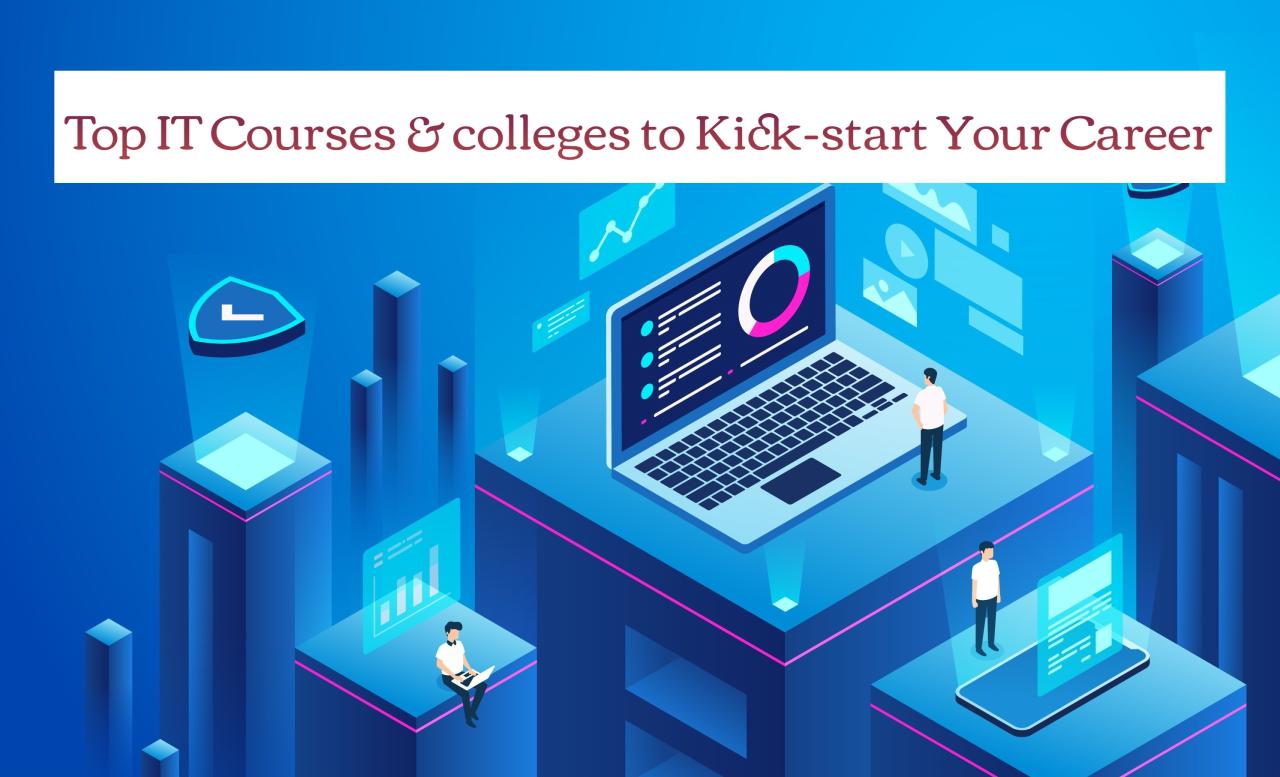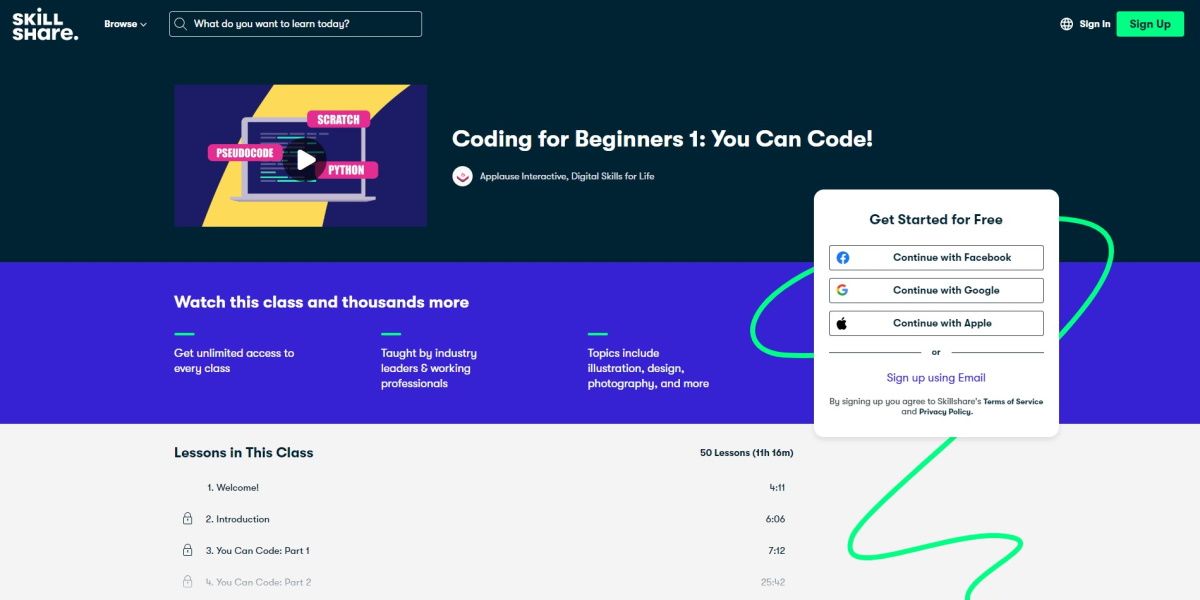Top-rated IT courses for beginners with career guidance are exploding in popularity! The tech world is hungry for talent, and launching a successful IT career has never been more accessible. This guide will help you navigate the options, choose the right course, and get your foot in the door of this exciting and lucrative field. We’ll cover everything from course selection criteria to essential skills, career paths, and job hunting strategies, setting you up for a rewarding future in IT.
We’ll explore different learning styles, delve into crucial curriculum components, and highlight the importance of building a strong portfolio and network. Think of this as your personalized roadmap to a thriving IT career, starting with the perfect beginner course.
Introduction to Top-Rated IT Courses for Beginners: Top-rated IT Courses For Beginners With Career Guidance
The IT industry is booming, creating a massive demand for skilled professionals. A career in IT offers excellent job security, high earning potential, and the chance to work on cutting-edge technologies. Choosing a reputable course is crucial for beginners to build a solid foundation and launch a successful career. Entry-level IT courses typically cover fundamental concepts in networking, operating systems, cybersecurity, and programming, providing a broad skillset for various roles.
So you’re thinking about boosting your career with top-rated IT courses for beginners? Finding the right program with solid career guidance is key. After a long day of studying, maybe you’ll want to treat yourself to some retail therapy – check out Southcentre Mall A Shopping Destination for a break. Then, get back to focusing on those courses and landing your dream IT job!
Benefits of an IT Career

An IT career offers numerous advantages. High salaries are a significant draw, with opportunities for continuous growth and advancement. The work is often stimulating and challenging, involving problem-solving and innovation. The industry is constantly evolving, offering diverse career paths and opportunities for specialization. Remote work options are also increasingly common, providing flexibility and work-life balance.
Importance of Choosing a Reputable Course
Selecting a reputable IT course is paramount for success. A well-structured curriculum, experienced instructors, and industry-relevant content are essential. Accreditation or certifications can enhance credibility and career prospects. Positive student reviews and a strong alumni network can indicate a quality program. Consider factors like course content, teaching methods, and career support services when making your decision.
Key Skills Learned in Entry-Level IT Courses
Entry-level IT courses typically equip students with fundamental skills in areas such as operating systems (Windows, macOS, Linux), networking fundamentals (TCP/IP, subnetting), basic cybersecurity concepts (threats, vulnerabilities, prevention), and introductory programming (Python, JavaScript). These skills provide a solid foundation for further specialization.
So you’re thinking about top-rated IT courses for beginners? Smart move! Landing a great IT job needs the right skills, and these courses often include career guidance. To stay ahead, though, you also need to keep an eye on emerging tech like what’s discussed at news technology events – understanding current trends will boost your job prospects after you finish your beginner IT courses.
It’s all about being prepared!
Identifying Top-Rated Courses: Criteria and Selection
Evaluating IT training programs requires careful consideration of several factors. Choosing between online and in-person learning depends on individual preferences and learning styles. Instructor qualifications and experience are also key aspects to assess.
Looking for top-rated IT courses for beginners with career guidance? Many programs offer pathways to exciting tech jobs. However, the rapid advancement of technology also presents new challenges; for example, check out this article about a concerning issue: Drone Crash in Paris A Growing Concern. This highlights the need for responsible tech development, a topic often covered in advanced IT courses.
So, choose a program that helps you navigate both opportunities and challenges in the tech world.
Criteria for Evaluating IT Training Programs
Five key criteria for evaluating IT training programs include:
- Curriculum relevance to industry needs
- Instructor expertise and experience
- Student support and resources available
- Accreditation or certifications offered
- Career services and job placement assistance
Online vs. In-Person Learning
Online courses offer flexibility and accessibility, while in-person courses provide direct interaction with instructors and peers. The choice depends on individual learning styles and preferences. Online courses often offer self-paced learning, while in-person courses usually follow a fixed schedule.
Importance of Instructor Qualifications

Experienced instructors with industry knowledge are crucial for effective learning. Look for instructors with relevant certifications, practical experience, and a proven track record of student success. Their ability to explain complex concepts clearly and answer student questions effectively is vital.
Comparison of Top-Rated Beginner IT Courses
This table compares four hypothetical top-rated beginner IT courses. Note that specific costs and durations can vary depending on the provider and course format.
| Course Name | Cost (USD) | Duration | Curriculum Highlights |
|---|---|---|---|
| Course A | $1500 | 12 weeks | Networking Fundamentals, Linux Administration, Basic Python |
| Course B | $2000 | 16 weeks | Cybersecurity Basics, Cloud Computing Introduction, Web Development Fundamentals |
| Course C | $1200 | 8 weeks | Operating Systems (Windows & macOS), Network Troubleshooting, Basic Scripting |
| Course D | $1800 | 10 weeks | Database Management, Data Analysis Introduction, IT Project Management |
Course Content and Curriculum Breakdown
A typical beginner IT course curriculum covers a range of foundational topics. Three essential modules common to most courses include networking fundamentals, operating systems, and introductory programming.
So you’re looking at top-rated IT courses for beginners with career guidance? That’s awesome! A strong tech foundation can open many doors, even unexpected ones. For instance, consider the growing field of drone technology; check out Sky Elements Drones Aerial Observation to see how IT skills are used in aerial imaging. Then, return to those beginner IT courses – your new skills might surprise you with the career paths they unlock!
Essential Modules and Practical Applications
The three essential modules are:
- Networking Fundamentals: Covers concepts like TCP/IP, subnetting, routing, and network security. Practical application includes configuring home networks, troubleshooting network issues, and understanding network topologies.
- Operating Systems: Introduces the core concepts of various operating systems (Windows, macOS, Linux). Practical application includes managing user accounts, installing software, troubleshooting system errors, and understanding file systems.
- Introductory Programming: Teaches basic programming concepts and a common language (Python, JavaScript). Practical application includes automating tasks, creating simple scripts, and building basic web applications.
Real-World Projects for Beginners, Top-rated IT courses for beginners with career guidance

Beginners can enhance their learning through projects like building a simple website, creating a network topology diagram, automating system tasks with scripting, or developing a basic database application. These projects provide hands-on experience and reinforce theoretical knowledge.
Career Guidance and Job Prospects
Completing a beginner IT course opens doors to various career paths. Networking and building professional connections are crucial for job searching and career advancement.
Career Paths and Job Responsibilities
Entry-level positions include help desk technician, network administrator, systems administrator, and junior programmer. Responsibilities often involve troubleshooting technical issues, providing user support, managing networks, and maintaining computer systems.
Importance of Networking
Networking involves building relationships with professionals in the field. Attending industry events, joining online communities, and connecting with alumni from your course can lead to valuable opportunities. A strong professional network can provide insights, mentorship, and potential job leads.
Resources for Job Searching and Career Advancement
- Indeed
- Monster
- Industry-specific job boards
- Professional networking events
Essential Skills and Technologies

Beyond technical skills, problem-solving and troubleshooting are crucial in IT. Five essential technologies beginners should learn include networking, operating systems, cloud computing, cybersecurity, and scripting/programming.
Essential Technologies and Their Applications
These technologies are interconnected and frequently used together. For example, cloud computing relies on networking for connectivity, while cybersecurity protects both cloud and on-premise systems. Scripting can automate tasks across all these technologies.
Visual Representation of Interconnected Technologies
Imagine a central hub representing “IT Infrastructure.” Five spokes radiate outwards, each representing one of the essential technologies: Networking, Operating Systems, Cloud Computing, Cybersecurity, and Scripting/Programming. Arrows connect the spokes to the hub and to each other, illustrating their interconnectedness. For example, an arrow connects Networking to Cloud Computing to show that cloud services rely on networks.
Another arrow connects Cybersecurity to all other spokes, emphasizing its role in protecting the entire infrastructure. Scripting/Programming connects to all other spokes, indicating its use in automating tasks across different areas.
Tips for Success in IT Training
Maximizing learning effectiveness requires dedicated effort and effective strategies. Building a strong portfolio is essential for showcasing skills to potential employers.
Tips for Maximizing Learning Effectiveness
- Active participation in class and labs
- Consistent practice and hands-on projects
- Effective time management and study habits
- Seeking help from instructors and peers when needed
- Continuous learning and staying updated with industry trends
Building a Strong Portfolio
A portfolio showcases your skills and projects. Include completed projects, code samples, and documentation of your work. Highlight your problem-solving abilities and your understanding of the technologies you’ve learned.
Importance of Continuous Learning
The IT industry is constantly evolving, requiring continuous learning and professional development. Stay updated with new technologies, trends, and best practices to remain competitive and advance your career.
Outcome Summary
Landing your dream IT job starts with the right training. By carefully considering the criteria for choosing a top-rated course, mastering essential skills, and actively building your professional network, you’ll significantly increase your chances of success. Remember, continuous learning is key in the ever-evolving tech landscape. So, start exploring, learn, and build a fantastic IT career!
Essential Questionnaire
What if I have no prior IT experience?
Many beginner IT courses are designed for absolute beginners. They start with the fundamentals, so no prior experience is needed.
How long do these courses typically take?
Course durations vary, from a few weeks for intensive bootcamps to several months for more comprehensive programs.
Are online courses as effective as in-person classes?
Both offer advantages. Online courses provide flexibility, while in-person classes offer more direct interaction with instructors and peers.
What kind of jobs can I get after completing a beginner IT course?
Entry-level roles include help desk technician, network administrator assistant, and junior systems analyst. The specific roles depend on the course’s focus.
How much do these courses cost?
Costs vary widely depending on the institution, course length, and intensity. Research different options to find one that fits your budget.
